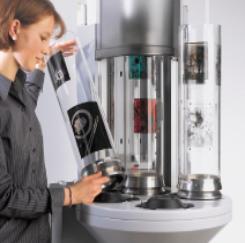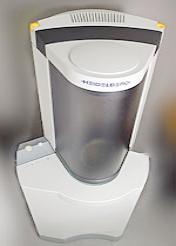- LUMINA Super Fluid is the scanning fluid of choice of smart drum scanner operators.
- UK customers were led to LUMINA after using other brands, with which they had experienced
crazing. They have selected LUMINA knowing it will not cause crazing of scanner drums, is fully
reliable and safe.
- Lumina's new chemistry did not exist when old fluids were introduced.
- The LUMINA page in this web site contains a full analysis of the issues and recommendations.
|
|
IS DRUM CRAZING DRIVING YOU CRAZY?
If you use a Drum Scanner, there are things you should know before going to the psycho
analyst, ...or the Bank
- Summing up on crazing:
- Stresses can be chemically or thermally induced or a combination of both.
- Chemical stresses are caused by substances that dissolve or become absorbed in the plastic
Absorption causes a volumetric expansion, which begins at the surface while the core, still unaffected,
does not expand. Acrylics are very rigid plastics, so the stresses are layered, not gradually dispersed. A
tug of war ensues between the volumetrically enlarged surface and the volumetrically intact core. The tug
of war is resolved by each, surface and core, going its own way. Fissures known as crazing develop as a
result of a layer's differential expansion. Initially, the stress caused by an attacking chemical may be
insufficient to cause a fracture, and may not show any damage even after multiple contact with the
attacking fluid until at some point, they reach the breaking point and crazing becomes evident.
- The fact that an attacking scanning fluid did not cause crazing even after used many times with no
apparent damage, is no assurance that the scanning fluid is a safe fluid. When the cumulative stresses
reach a breaking point they result in crazing but not before.
- Some scanning fluids whose crazing tendencies are weak, can be synergized into active crazing agents
when combined with certain substances, as for example some of the lower alcohols, methanol and ethyl,
or isopropyl alcohol. This is why you should not use cleaners containing these substances immediately
preceding drum scanning. Although the lower alcohols are very volatile when they are absorbed into the
film emulsion they are released very slowly.
- Thermal stresses are caused by differential expansion or contraction between the bulk of the plastic
and the surface. A sudden temperature increase at the surface will expand it more rapidly than the bulk
of the plastic. The high rigidity of the plastic does not allow the relaxing of the stresses stemming from
differential dimensional changes resulting from differential thermal changes within the various layers. This
creates a situation in which the surface wants to expand but is restrained from so doing by the cooler
core. Some drum scanning operators have been known to store the drums in the freezer to facilitate easy
removal of tape residues. In doing so they subject the drum to thermal stresses. Rapid and drastic
temperature variations can also be experienced by the plastic as for example during shipping in cold
weather.
- Associated products such as tape and drum cleaners all are part of the drum hygiene equation, and must
be carefully selected to avoid damaging drums.
- Clear and definitive forensics can be difficult to obtain so it is imperative that scanning fluids that contain
substances likely to damage the drum be avoided. The cost of fluid is ultimately a small part of the cost of
fluid scanning especially if the cost of a drum is factored in. A cheaper scanning fluid may be the most
expensive.
- LUMINA is highly pure and its composition is the safest for Scanning Drums.
|
|
|













